| Srl | Item |
| 1 |
ID:
129841
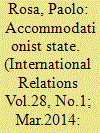

|
|
|
|
|
| Publication |
2014.
|
| Summary/Abstract |
This article aims to highlight the impact of strategic culture on Italian attitude to war and peace. The first section shows how both structural interpretations based on the influence of international variables and domestic models that neglect the cultural dimension offer no adequate explanations of Italy's military behaviour. The second section reviews the literature on strategic culture and its usefulness to explain the Italian case. The third section examines the characteristics of Italy's strategic culture through the period of the Republic, and the fourth examines the influence of ideational factors on its military behaviour abroad. In this section, a series of hypotheses derived from structural and cultural models are tested using data from the Correlates of War dataset. The conclusion provides a summary of the research findings that emerged from the empirical analysis.
|
|
|
|
|
|
|
|
|
|
|
|
|
|
|
|
| 2 |
ID:
129835
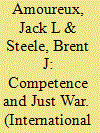

|
|
|
|
|
| Publication |
2014.
|
| Summary/Abstract |
This article argues that the Just War tradition would do well to consider the importance of competence - and that doing so would invigorate debates about the use of organized violence. The article defends this argument through several moves. First, inspired by Aristotle's thoughts on phronesis and chance, we view competence as a practice among those who, as a matter of course, engage in practical reasoning that takes into account the contingency of political action. Second, following from Arendt, competence can be considered that which foregrounds means over ends. Third, because competence is a continuous and more vigilant consideration of justice within war, it extends through both jus ad bellum and jus in bello principles, including the 'proper authority' and 'reasonable chance for success' conditions of the former, and the 'double effect' doctrine discussed in the latter. The article concludes by acknowledging the challenges presented by an overemphasis on competence, before ultimately restating its purchase for Just War debates in the twenty-first century.
|
|
|
|
|
|
|
|
|
|
|
|
|
|
|
|
| 3 |
ID:
129846
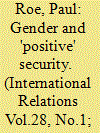

|
|
|
|
|
| Publication |
2014.
|
| Summary/Abstract |
Focusing predominantly on the works of Ken Booth and Bill McSweeney, this article explores how the normative commitment of the two writers to the individual referent and to a set of values constitutive of human agency is reflective of a more 'positive' security. In particular, the article focuses on how in their formulation of values, both Booth (security as emancipation) and McSweeney (ontological security) draw on gender and feminist approaches and, importantly, how critical feminist scholarship can profitably be used to reconcile concentration on both the global and the local, thus providing greater conceptual clarity and empirical grounding to the positive security project.
|
|
|
|
|
|
|
|
|
|
|
|
|
|
|
|
| 4 |
ID:
129808
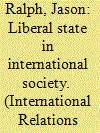

|
|
|
|
|
| Publication |
2014.
|
| Summary/Abstract |
The question of who decides when a state has not met its international responsibilities (and therefore forfeits the right to non-intervention) and what kind of international action should be taken (from limited intervention to full-blown regime change) divides liberal foreign policy thinking. To understand the nature of that division, and what is at stake, this article distinguishes 'neoliberal' from 'liberal internationalist' approaches and locates them in an English School understanding of international society. Where the latter stresses the importance of observing the procedural norms centred on the United Nations, the former contests the legitimacy of such norms if they fail to deliver substantive liberal outcomes. The article then interprets British foreign policy discourse either side of the 2003 Iraq conflict through the prism of this debate. The central claim is that a more cautious approach to the use of force and American unilateralism has not silenced the critique of the UN system and that the international reaction to the Libyan intervention prompts the kind of reflection that continues to separate neoliberal from liberal internationalist approaches.
|
|
|
|
|
|
|
|
|
|
|
|
|
|
|
|
| 5 |
ID:
129818


|
|
|
|
|
| Publication |
2014.
|
| Summary/Abstract |
On 5 June 2008, then Russian President Dmitry Medvedev proposed a new European security architecture. Medvedev suggested that the new security architecture could be considered a 'Helsinki Plus' treaty, an adaptation of the Helsinki Final Act to the current international state of affairs. This article examines how Russia was strategically reframing European security through its proposal for a new European security architecture, and in particular the sub-issues of how Russia was strategically framing security and European security and how this framing was an attempt to change existing formulations and perspectives on European security.
|
|
|
|
|
|
|
|
|
|
|
|
|
|
|
|
| 6 |
ID:
129832
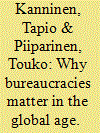

|
|
|
|
|
| Publication |
2014.
|
| Summary/Abstract |
This article will challenge the conventional wisdom according to which international bureaucracies are unviable and undesirable in the age of globalisation. The relevance and powers of today's international bureaucracies can best be understood by reference to the model of the 'network logic of globalisation' rather than Max Weber's classic theory alone. Bureaucracies are undergoing a transformation from the rigid and hierarchical institutions of Weber's time to more network-oriented and delayered post-Weberian entities. On occasion, these post-Weberian structures allow middle-level officials in international organisations to wield considerable new bureaucratic powers. The case study of this article draws upon empirical evidence on the drafting and implementation of An Agenda for Peace (1992) by UN Secretariat officials and its contributions to the United Nations early warning and conflict prevention mechanism. The network-oriented structures and approaches have started to permeate the UN Organisation in two ways: First, the United Nations operates more and more through interdepartmental and interagency teams. This trend was evident already in the drafting and implementation processes of the Agenda. Second, the United Nations is reaching out to academic and civil society networks. The start of these two transformations of the UN bureaucracy is related to globalisation and can be seen already in action in the early 1990s when the Agenda was drafted.
|
|
|
|
|
|
|
|
|
|
|
|
|
|
|
|